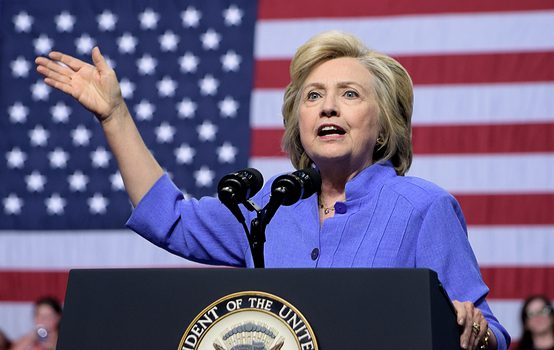Clinton’s Aggressive Foreign Policy

Many in the foreign policy establishment are laying out the blueprints for more aggressive policies overseas under a Clinton administration:
Taken together, the studies and reports call for more-aggressive American action to constrain Iran, rein in the chaos in the Middle East and check Russia in Europe.
The studies, which reflect Clinton’s stated views and the direction she is likely to take if she is elected [bold mine-DL], break most forcefully with Obama on Syria. Virtually all these efforts, including a report that will be released Wednesday by the liberal Center for American Progress, call for stepped up military action to deter President Bashar al-Assad’s regime and Russian forces in Syria.
The proposed military measures include calls for safe zones to protect moderate rebels from Syrian and Russian forces. Most of the studies propose limited American airstrikes with cruise missiles to punish Assad if he continues to attack civilians with barrel bombs, as is currently happening in besieged Aleppo. So far, Obama has staunchly resisted any military action against the Assad regime.
Clinton’s predictable hawkishness is not news to me or anyone reading my posts on her foreign policy over the years, but for much of the last year there have been several attempts to dismiss or downplay Clinton’s record and her own statements about what she wants to do abroad. The presidential debates mostly ignored foreign policy, and Clinton faced very few hard questions about what she did in the Obama administration or what she would do in the White House. That the U.S. will have a significantly more aggressive foreign policy under Clinton–happily embraced by much of the foreign policy establishment–seems to be obvious to anyone that looks at the evidence, but it is one of the least-discussed parts of the election campaign.
Even though Clinton’s proposed policies commit the U.S. to a larger military role in Syria and potentially risk even greater escalation with Russia in the future, she has largely been given a pass for this and for endorsing more aggressive policies across the board. The problem here isn’t just that those policies are dangerous and reckless, but that she has been allowed to go through the entire campaign without having her proposals put under the necessary scrutiny and criticism that any presidential candidate should have to undergo. Clinton will be coming into office with a more aggressive foreign policy agenda that has never been seriously debated and which most voters will know little or nothing about.
Foreign policy professionals and pundits have spent the last several years paving the way for this more aggressive foreign policy with their constant complaints about America’s supposed “retreat” from the world under Obama and his alleged “inaction” in Syria. In reality, the U.S. hasn’t retreated, it is is deeply ensnared in multiple foreign conflicts, and it has been anything but inactive in Syria, but according to the fantasy version of the last seven years Obama has presided over “withdrawal” and “retrenchment.” That sets up Clinton to offer a supposed “middle ground” between Bush and Obama:
Virtually no one among the foreign policy elite is calling for a return to the Bush administration policies that led to the toppling of Saddam Hussein and the costly occupation of Iraq. Instead, they are advocating something of a middle ground between Bush’s interventionism and Obama’s retrenchment.
So Clinton’s foreign policy will strike a “balance” between Obama’s eight years of unending war in multiple countries and Bush’s very costly, illegal, and strategically disastrous debacle. The “middle ground” framing used to describe Clinton’s position is damning. It tells us that her foreign policy is supposed to be equidistant between Bush’s exorbitant and ruinous record and Obama’s largely unsuccessful but much less expensive one, and the amazing thing is that her supporters think this is something to tout. In practice, this guarantees the continuation of existing wars and it likely means the initiation of new ones somewhere down the road.
Comments